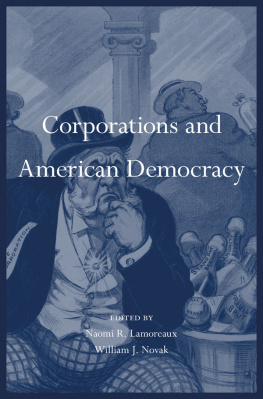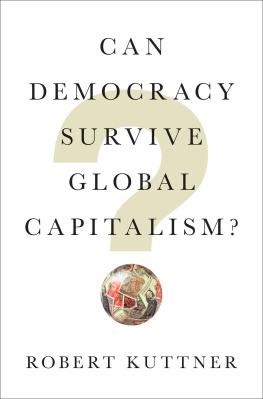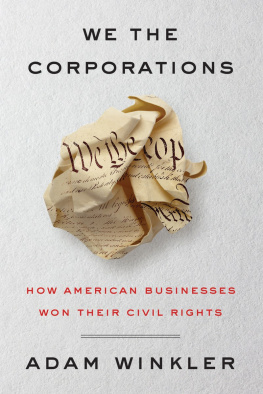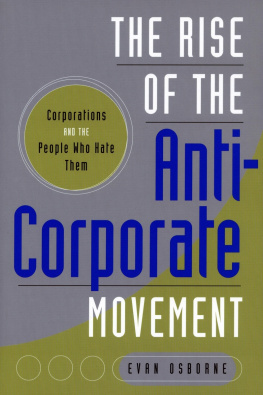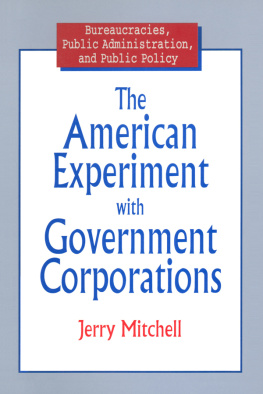Corporations and American Democracy
Edited by
NAOMI R. LAMOREAUX
WILLIAM J. NOVAK


CAMBRIDGE, MASSACHUSETTS, AND LONDON, ENGLAND 2017
Copyright 2017 by the Tobin Project
All rights reserved
Cover art: Times have changed, illustration from Puck magazine by Udo J. Keppler, 1908, courtesy of the Library of Congress.
Cover design: Tim Jones
978-0-674-97228-5 (alk. paper)
978-0-674-97771-6 (EPUB)
978-0-674-97769-3 (MOBI)
978-0-674-97768-6 (PDF)
The Library of Congress has cataloged the printed edition as follows:
Names: Lamoreaux, Naomi R., editor. | Novak, William J., 1961 editor.
Title: Corporations and American democracy / edited by Naomi R. Lamoreaux, William J. Novak.
Description: | Includes bibliographical references and index.
Identifiers: LCCN 2016046006
Subjects: LCSH: Corporation lawUnited StatesHistory. | Corporate powerUnited StatesHistory. | Civil rights of corporationsUnited StatesHistory. | CorporationsPolitical activityLaw and legislationUnited StatesHistory. | DemocracyUnited StatesHistory.
Classification: LCC KF1384 .C67 2017 | DDC 346.73/066609dc23 LC record available at https://lccn.loc.gov/2016046006
Contents
- by NAOMI R. LAMOREAUX and WILLIAM J. NOVAK
- by ERIC HILT
- by JESSICA L. HENNESSEY and JOHN JOSEPH WALLIS
- by DANIEL A. CRANE
- by WILLIAM J. NOVAK
- by STEVEN A. BANK and AJAY K. MEHROTRA
- by JONATHAN LEVY
- by MARGARET M. BLAIR and ELIZABETH POLLMAN
- by RUTH H. BLOCH and NAOMI R. LAMOREAUX
- by NELSON LICHTENSTEIN
- by ADAM WINKLER
This is the first comprehensive history of the relationship between American democracy and the corporation. The rights, responsibilities, and influence of corporations are frequently discussed in popular media and political campaigns, but these accounts seldom recognize the full extent of the corporations role in American democracy. Since the founding era, corporations have been created and regulated in a variety of ways to address the recurring challenges of democracy. Yet from the development of general incorporation laws to judicial decisions about corporate rights, solutions to one problem have at times sown the seeds from which new and unforeseen problems have grown. Although this volume is a work of history and not a roadmap for future policy, it nonetheless can help us make more informed decisions about our present moment. In tracing how corporations have both created and addressed problems of democracy, this work provides context that enables us to make better sense of the risks and opportunities that confront Americans choices about corporations.
Corporations and American Democracy is a product of scholars coming together through the Tobin Project to undertake new research aimed at identifying and addressing American democracys most pressing problems. The Tobin Project is organized around the beliefarticulated many times by the Nobel economist James Tobinthat outstanding scholarship on important questions can make a profound difference in society. The authors of this volume took up Professor Tobins call, and devoted their time and energy to participate in this work, which spanned several years of collaboration, research, writing, and editing. Other policy makers, practitioners, and scholars helped to shape the questions that motivated this research and to refine the answers provided in the pages ahead. The Tobin Project is grateful to all who contributed to this work, and we look forward to engaging a growing community in building a clear and rigorous understanding of the most important challenges facing our democracy.
The Tobin Project
Cambridge, MA
NAOMI R. LAMOREAUX and WILLIAM J. NOVAK
The United States Supreme Courts decisions in Citizens United and Hobby Lobby have once again thrust controversies about the proper role of corporations in American democracy onto the national stage. Debates about corporate personhood, corporate power, and corporate responsibility proliferate throughout the public spherefrom political stump speeches to newspaper editorial pages, from the televised verbal wrestling of cable news to the distinctly untelevised sparring in Supreme Court opinions and dissents. To date, however, the level of discourse has remained primarily political if not polemical. Participants have made bold assertions about the nature of corporations and corporate rights without much empirical support. Moreover, they have legitimized their positions by grounding them in claims about the history of corporations in the United States that are at best outdated, if not entirely lacking in scholarly foundation. The purpose of this volume is to provide a better historical foundation for these important debates and discussions.
Although much has been written about corporations and American democracy over the last centuryfrom Louis Brandeiss Other Peoples Money to John Commonss Legal Foundations of Capitalism to Adolf Berle and Gardiner Meanss The Modern Corporation and Private Property to John Kenneth Galbraiths American Capitalismimportant aspects of the history, law, and economics of corporate policymaking remain poorly understood. What was the original understanding of the corporation at the time of the American founding? When and where did the corporation first begin to proliferate as a preferred mode of organization for businesses and other associations? What rights, privileges, and obligations attended the corporate form? And how and why did these change over time? To what extent over the course of American history have the rights of corporations as legal persons been differentiated from those of human persons? Should all corporations be treated the same, or are there vital differences that demand recognition between for-profit and not-for-profit corporations, public service corporations and private manufacturing corporations, media corporations and incorporated charities or religious associations? What were the factors driving changes in the relationship between the corporation and American democracy over time?
The chapters that follow begin filling in answers to these questions. The first essays document the fundamental nature of the shift from special charters to general incorporation in the first half of the nineteenth century; the last provide historical context for the Supreme Courts recent decisions in Citizens United and Hobby Lobby. In between, they detail the development of new types of corporations, new types of regulatory initiatives, and the interaction between the two. Although the chapters cover different time periods and topics with distinctive authorial voices, taken together they offer a remarkably coherent perspective on the relationship between the corporation and American legal, economic, and political institutions. Here, we highlight three major themes that thread through the volume.
Theme one concerns Americans long-standing love / hate relationship with the corporationtheir enthusiastic embrace of the corporation as an engine of opportunity and prosperity, and their simultaneous skeptical distrust of it as a source of corruption and driver of inequality. This deep ambivalence has shaped public policy concerning the corporation throughout American history. On the one hand, the corporation has long been seen as a useful and alluring vehicle for harnessing and distributing the collective energies of individualsan engine of economic growth and a bulwark of democratic prosperity. On the other hand, that same corporate vehicle has been viewed with suspicion as a potentially dangerous threat to that same democracya site of coercion, monopoly, and the agglomeration of excessive social, economic, and political power. Competing visions of the corporation as alternatively a source of extraordinary public material benefit and a font of democratically unaccountable private power have animated much of the history of the corporation in America.

